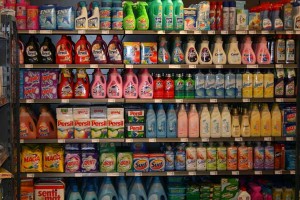You’re Not Nearly As Safe As You Think You Are
 Most Americans assume that by the time a product has made it to market, it must have been tested for its toxicity. Nope. Not even close. Of the approximately 85,000 chemicals available to a consumer in the US, only a tiny fraction have been tested for their impact to human health, or for their health impact in combination with the other 84,999 chemicals.
Most Americans assume that by the time a product has made it to market, it must have been tested for its toxicity. Nope. Not even close. Of the approximately 85,000 chemicals available to a consumer in the US, only a tiny fraction have been tested for their impact to human health, or for their health impact in combination with the other 84,999 chemicals.
Or for that matter, their impact on downwind populations breathing their smoldering remains from cement kilns burning garbage for fuel.
This is one reason why babies are born "pre-polluted," hosting a laundry list of synthetic chemicals inside their tiny bodies before they're even out of the womb.
There is a federal law that's supposed to prevent toxic chemicals from entering the marketplace, the Toxic Substances Control Act. But as this article from the New York Times reminds us, it's "the only major environmental statute whose core provisions have not been re-authorized or substantively updated since its adoption in the 1970s," when there were maybe only 25,000 chemicals untested.
There is now a presumption under the law that a substance is "safe until proven guilty." This is exactly opposite of what a logical approach would look like, given all we know about the toxicology of chemical exposure. Indeed, this is why there's an explicit alternative in the form of the "Precatuonary Principle" that says a chemical should not be marketed until it's thoroughly tested for health impacts.
And sure enough, there's some congressional pressure to change the 40-year old law to reflect modern science.
Federal reform of the toxic substances act may be coming. Last week, Senator Frank R. Lautenberg, Democrat of New Jersey, and Senator Kirsten E. Gillibrand, Democrat of New York, introduced a bill called the Safe Chemicals Act of 2013, which would require the chemical industry to demonstrate that a chemical is safe in order for it to be sold. The bill, which has more than 25 Democratic co-sponsors, would put limits on trade secret practices and requires industry to reduce use of the chemicals designated by the E.P.A. as being of “greatest concern” because they are most toxic.
There is zero chance of such a bill making it through this House, or perhaps even this theoretically Democratically-controlled Senate, but it's good to begin having the discussion,because even the industry folks are beginning to act a little nervous about the gap between perception and reality.
